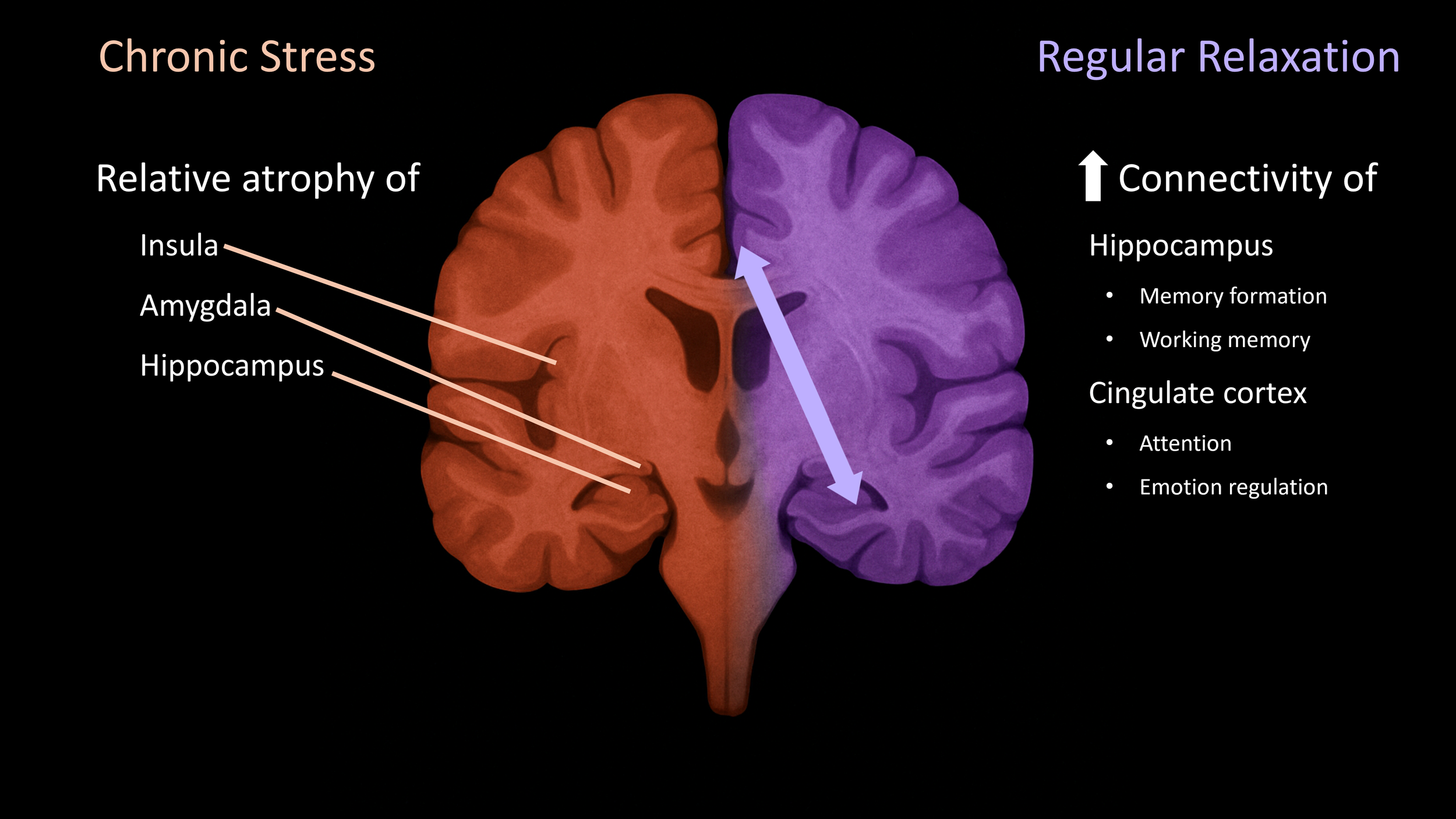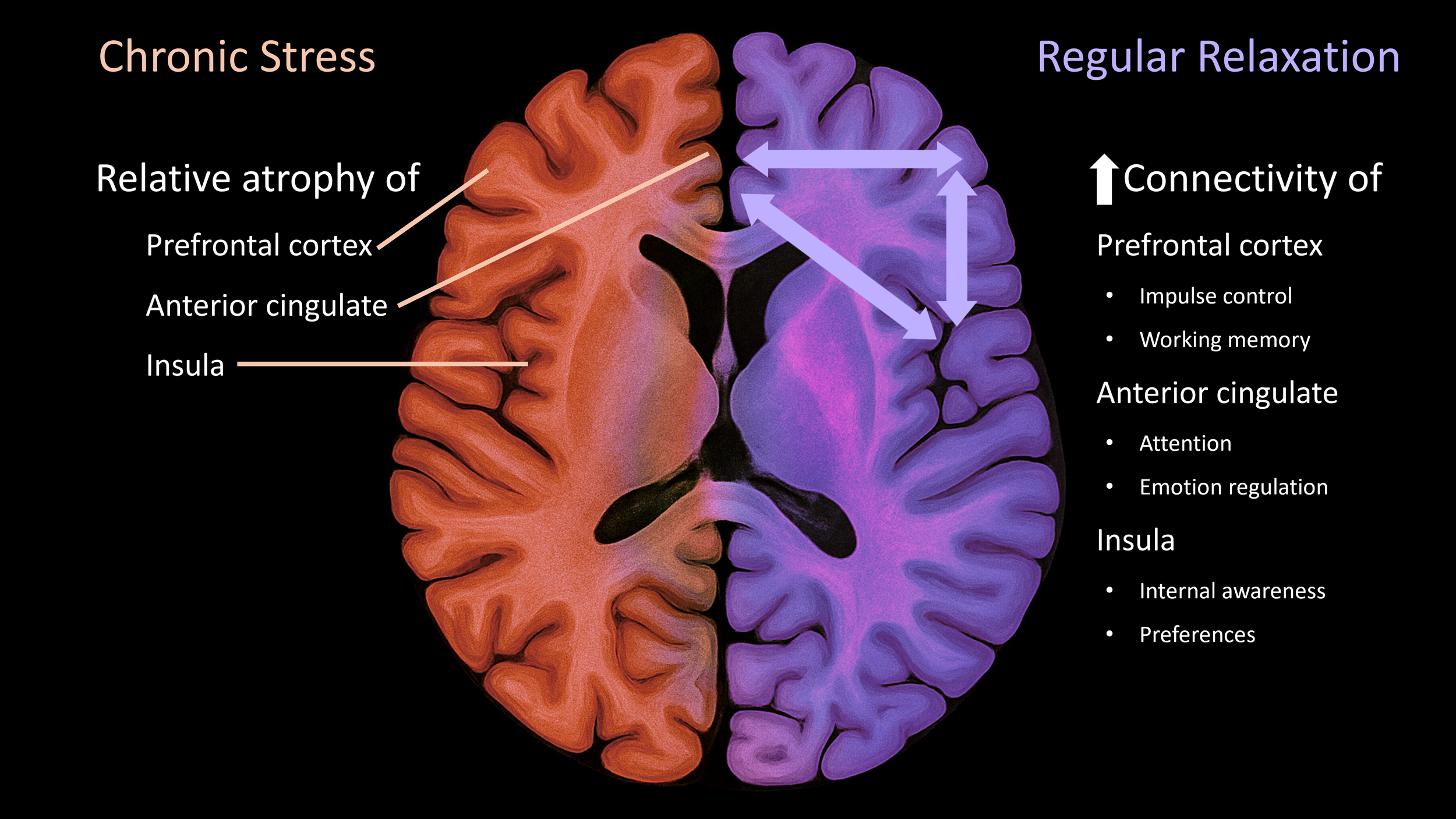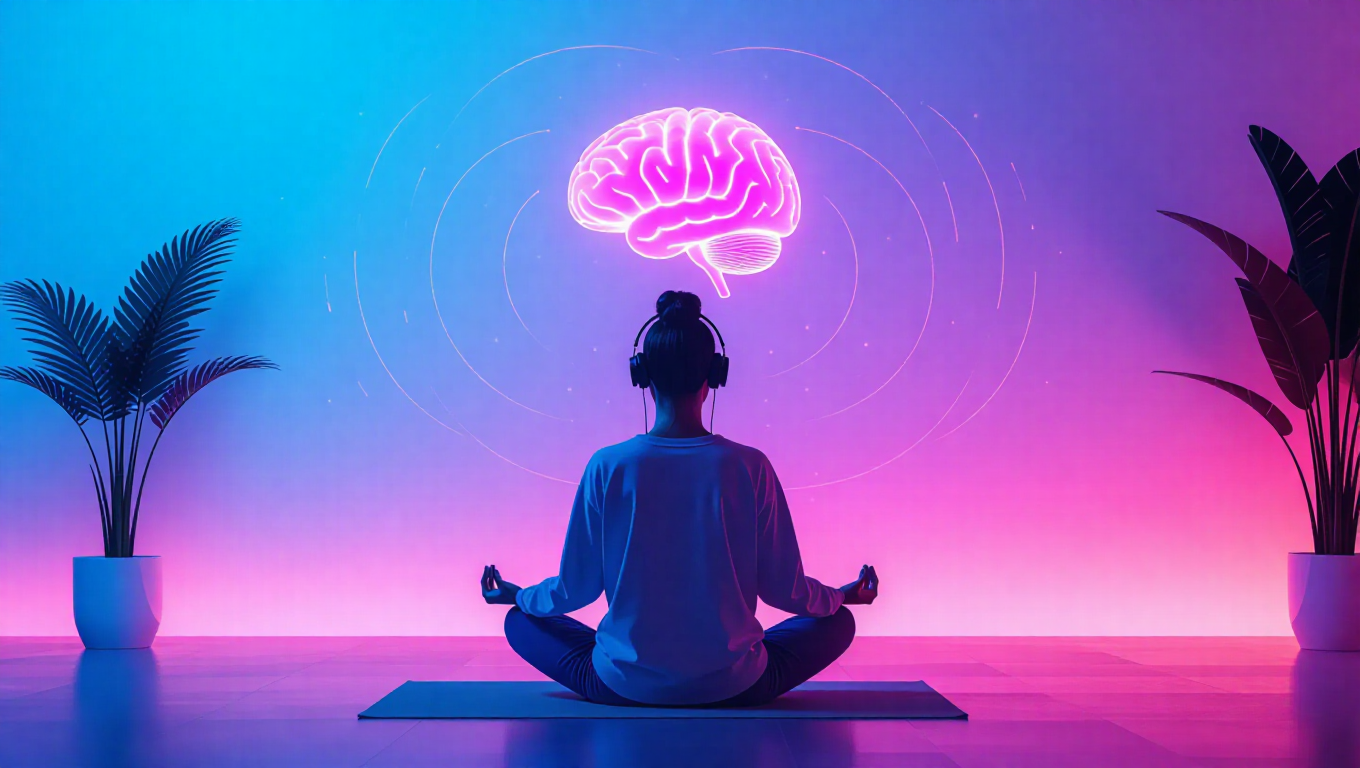What Happens in Your Brain During Deep Relaxation?
Have you ever set aside time to rest, sit quietly, or meditate and started wondering “Is this actually doing anything?”
You’re not alone.
In a world that rewards constant hustle, slowing down can feel lazy or unproductive. But science tells a different story. Deep relaxation is not just a break from stress. It is an active process that helps your brain heal, grow, and function better. In fact, planned relaxation (like meditation, deep breathing, or guided sound therapy) can actually reshape your brain’s structure and improve the way it works.
Let’s explore what happens in your brain when you relax on purpose. Spoiler: it is more powerful than you might think.
Why We Need to Talk About Relaxation
Many of us are living in “go-mode” all the time. Between work, family, and never-ending to-do lists, our brains are constantly managing stress.
This type of chronic stress can overload the brain, making it harder to focus, remember things, or manage emotions. Over time, it leads to mental burnout and can even change the physical structure of the brain.
But here’s the good news: deep, intentional relaxation activates the opposite effect.
Just like lifting weights builds your muscles, relaxation strengthens your brain’s ability to manage stress and think clearly.
And the best part? You don’t need hours of silence or a trip to a mountain retreat to benefit. Even a few minutes a day can start to create changes in your brain.
The Brain on Stress vs. The Brain at Rest
Before we dive into relaxation, it helps to understand how stress affects your brain.
When you are under stress, your brain’s alarm system kicks in. This system includes the:
Amygdala, which senses danger and triggers emotional reactions like fear and anxiety
Hypothalamus, which activates your body’s stress hormones (like cortisol)
Prefrontal cortex, which normally helps with planning and decision-making, but shuts down when stress takes over
In short, stress flips your brain into survival mode. You get tunnel vision, your memory weakens, and it becomes harder to focus or think creatively.
But when you enter a relaxed state, the brain begins to shift into a mode called the "rest and repair" system. Here, a different group of brain regions lights up:
The insula, which helps you tune into your body and emotions
The anterior cingulate cortex (ACC), which helps with attention and self-control
The hippocampus, which plays a big role in learning and memory
The prefrontal cortex, which re-engages and supports rational thinking
Together, these areas help calm the body, reduce mental clutter, and create the conditions your brain needs to thrive.
The Science of Structural Brain Changes
It might sound surprising, but your brain is not fixed. It is always changing. This ability to adapt and grow is called neuroplasticity.
Research has shown that regular relaxation practices like mindfulness, meditation, deep breathing, or even progressive muscle relaxation can actually change the brain’s physical structure.
A large review of brain scans from people who meditate regularly found consistent differences in several brain areas compared to people who do not meditate.
Here are some of the key changes seen in the brains of long-term relaxation practitioners:
More gray matter in the hippocampus, which helps with memory and emotional balance
Thicker prefrontal cortex, the brain’s decision-making center
Stronger connections between brain regions, especially those that help with focus and emotional regulation
Calmer, less reactive amygdala, which means a better response to stress
These changes were especially strong in people who practiced relaxation over long periods, but some benefits were seen even after just a few weeks.
What About Short-Term Relaxation?
You might be thinking, “That’s great for long-term meditators, but what happens if I just take five minutes to breathe deeply or listen to calming music?”
The answer is: your brain still benefits.
Short-term relaxation has been shown to lower stress hormones, activate calm brain waves (like alpha and theta waves), and improve your heart rate and breathing patterns.
A study looking at deep breathing and muscle relaxation found that even a single session could reduce anxiety, improve focus, and help balance the brain's stress response systems.
This means you do not need to be a full-time monk to benefit from relaxation. A few mindful moments throughout your day can help re-center your brain and body.
The Role of the Insula and Anterior Cingulate: The Body-Mind Link
One of the most fascinating discoveries in recent brain research is how much the insula and anterior cingulate cortex are involved in deep relaxation.
The insula is a region deep inside your brain that helps you notice internal signals like your heartbeat, your breathing, or the feeling in your stomach. It is key to self-awareness and emotional balance.
The anterior cingulate cortex helps you manage attention, make choices, and stay calm under pressure. It also helps connect your thoughts and emotions, making it easier to reflect instead of react.
When you relax, both of these areas become more active and more connected. This helps explain why relaxation practices often lead to a sense of calm, better emotional control, and improved focus.
Over time, repeated activation of these regions strengthens their ability to help you stay centered in the face of stress.
Deep Relaxation and the Body’s Repair System
Relaxation doesn’t just help your mind. It has big effects on your body too.
When you enter a relaxed state, your body shifts into what scientists call the parasympathetic nervous system. This system slows your heart rate, lowers blood pressure, and improves digestion. It is the opposite of the fight-or-flight response.
Researchers have found that techniques like deep breathing, meditation, and progressive muscle relaxation all help activate this system. This leads to:
Lower levels of cortisol (a stress hormone)
Improved immune function
Better hormone balance
Reduced inflammation
In other words, relaxation gives your body the tools it needs to recover and stay healthy.
Real-World Benefits: From the Lab to Your Life
So what does all this mean for you in your daily life?
People who practice deep relaxation regularly report:
Fewer episodes of burnout
Improved focus and memory
Better sleep
Greater emotional control
More energy and creativity
Increased resilience in high-pressure environments
And these are not just personal observations. Studies show that professionals in high-stress jobs (like healthcare, law, education, and tech) perform better and make fewer mistakes when they regularly engage in brain-based relaxation techniques.
Relaxation is not a luxury. It is a tool for mental sharpness and emotional strength.
How MelodiaSync Supports Deep Brain Relaxation
In today’s fast-paced world, your brain deserves better tools to manage stress.
Our EEG-guided sound therapy system is designed to help your brain enter relaxed and focused states more easily. Here's how it works:
Real-time brain monitoring
A lightweight EEG headset reads your brain activity.Smart sound guidance
Our system delivers personalized binaural beats, carefully selected to match your current state and gently guide your brain into calmer rhythms.Neurofeedback-based training
Over time, your brain learns how to enter and stay in these states on its own, with added benefits of improving focus, reducing stress, and boosting cognitive resilience.
We do not just want you to feel relaxed for a moment. We want to help you build a brain that knows how to return to balance when life gets overwhelming.
Whether you are a physician, an entrepreneur, a student, or a parent, your mind is your most important tool. We are here to help you protect it.
Try This Today: A 3-Minute Reset for Your Brain
If you are feeling overwhelmed, give this simple practice a try:
1. Find a quiet space
Sit comfortably. Let your shoulders drop.
2. Breathe deeply
Inhale for 4 counts
Hold for 4 counts
Exhale slowly for 6 counts
Repeat for 5–10 breaths
3. Tune in
Notice how your body feels. Are there areas of tightness or ease? Just observe without judgment.
4. Ask yourself
“What is one thing I can let go of today?”
This short practice can interrupt stress and remind your brain how to shift into a calmer state. It’s a small but powerful step toward better mental health.
Final Thoughts: Your Brain Is Built to Heal
We live in a world that often praises doing more and resting less. But science shows that deep relaxation is one of the most powerful things you can do for your brain.
It strengthens attention, improves emotional control, and rebuilds the areas damaged by chronic stress. And it does this without pills, side effects, or massive time commitments.
So, the next time you choose to pause, breathe, or listen to a calming track, remember this: you are not wasting time. You are rewiring your brain for clarity, focus, and peace.
At MelodiaSync, we are here to help you make that change easier, deeper, and more sustainable.
Because your best thinking, your sharpest ideas, and your strongest resilience all start with one simple act:
Relaxation, on purpose.
Disclaimer: This blog post is intended for informational purposes only and does not constitute medical advice. Please consult a qualified healthcare professional for any medical concerns or treatment decisions.




